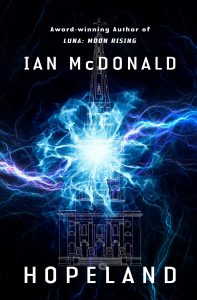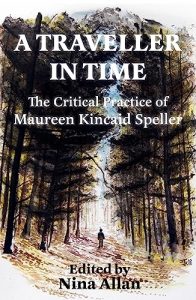The Year in Review 2023 by Paul Kincaid
It has been one of those years that come along irregularly in which, wherever we look, we come upon literary treasures.
No fans of the short story, for instance, should complain about a year in which we have been gifted with new collections by Kate Atkinson and Steven Millhauser. Both writers, incidentally, who should be far better known among readers of the fantastic. Kate Atkinson’s first collection in 20 years, Normal Rules Don’t Apply (Doubleday), is a set of linked stories, although we don’t appreciate the extent to which they are interconnected until we are something like two-thirds of the way through the collection. Here, for instance, we meet the sister of God who works in a small advertising agency, and who suddenly finds herself having to step into the world creation business, and takes it as an opportunity to try out some of her more modish ideas. And there is a gambler whose luck at the races begins to turn when a horse starts talking to him, though his luck isn’t all good, as he finds when he is set up to take the fall for a murder.
Steven Millhauser’s Disruptions (Knopf), on the other hand, returns us to his familiar landscape of small New England towns. But here one man climbs a ladder into a cloud and disappears. In another town the residents redesign their homes, their gardens, even their sex lives, to make everything into a shadow play. In one town a guillotine has been set up in the town square, in another the town contains a whole other town whose residents are only a couple of inches tall.
I have not yet had the chance to read all of the highly rated novels of the year, so there are doubtless further treasures to be discovered. Though the novels I have read would stand out in any year. Chief among them is Conquest (riverrun), which may be the best thing Nina Allan has written to date, though the competition for that particular title is, admittedly, fierce. It is an extraordinary book that enfolds within it an entire (fictional) 1950s science fiction story, along with essays on (genuine) films and music. These interpolated works provide the evidence for what may be alien invasion, may be conspiracy theory, or may be something else entirely. All triggered by the disappearance of a young man who appears to be somewhere on the autism spectrum.
 Then there is Hopeland (Gollancz), a monumental work which has a good claim to be the best novel Ian McDonald has written since The Dervish House. Part secret history, part future history, the novel takes us from the very recent past into the not-too-distant future, and ranges from the equatorial islands of the Pacific to the arctic ranges of Iceland and Greenland, to present a world in the grip of climate change. It is characteristic of McDonald’s best work in immersing itself carefully and sympathetically in the culture of the various peoples encountered in the story, and though the story itself is one of the slow, inevitable catastrophe of the Anthropocene, it is, as the title implies, not without hope.
Then there is Hopeland (Gollancz), a monumental work which has a good claim to be the best novel Ian McDonald has written since The Dervish House. Part secret history, part future history, the novel takes us from the very recent past into the not-too-distant future, and ranges from the equatorial islands of the Pacific to the arctic ranges of Iceland and Greenland, to present a world in the grip of climate change. It is characteristic of McDonald’s best work in immersing itself carefully and sympathetically in the culture of the various peoples encountered in the story, and though the story itself is one of the slow, inevitable catastrophe of the Anthropocene, it is, as the title implies, not without hope.
I remain unconvinced that the latest novel from Christopher Priest, Airside (Gollancz), is actually science fiction, unless we conclude that entry into the highly structured and invariably maddening system of an airport is itself to step into a fantastical realm. Nevertheless, it is by Priest, and it is one of the very best examples of the rush of late novels that have appeared over the last decade or so, and thus it is more than worthy of our attention. Moreover, the immersion into the world of film triggered by the long-ago and unexplained disappearance of a starlet on arrival at London, takes us into a world that has fascinated Priest since his youth and suggests that this is a work particularly close to his heart.
I would not normally venture into the realm of the art book in these surveys of the year, it is, after all, not exactly my forte. But, as I have been implying throughout, this has been an exceptional year, and two books particularly caught my eye.
Actually, I’m not sure that ‘‘art book’’ is the correct designation for The Culture: The Drawings (Orbit) by Iain M. Banks. Artistic merit is not exactly what we are looking for in these pencil sketches of ships and weapons and other paraphernalia from Banks’s Culture novels. The objects are generally poorly drawn, blocky objects of straight lines and no distinguishing features. But that is not what makes the book interesting. These scribbles from sketch pads and loose sheets of paper were clearly intended as an aide-mémoire, and around each drawing are not-always-legible numbers that tell us the size of the ship, the armaments it carries, the number and type of bays, and the number of people it can carry. The Continent Class GSV, for instance, has a size of 25km x 9.6km x 3.3km, and a total crew of 52,170,000, which strikes me as pretty cramped even in such a large vessel.
The Banks book has been eagerly awaited by fans of his writing, but I have been waiting longer and more eagerly for Masques of the Disappeared: 1971-2023 (Polder House) by Judith Clute. Clute’s etchings and paintings have always done for me what the very best science fiction does: They make me stop, reconsider, reassess, think! Her juxtapositions, often bizarre, always disturbing, take me into realms in which reality has become unstable. Beautifully reproduced in this book, and with insightful commentary from the artist herself, this is a volume for which we have been waiting far too long. Thankfully it is here now.
Finally, I turn to non-fiction, which has seen an even greater wealth of treasure this year. Let’s face it, any other time Niall Harrison’s first collection of reviews and essays, All These Worlds (Briardene Books), would easily have topped every list for best non-fiction book of the year. It is a vigorous, insightful collection of work that marks the very welcome return of a great critic who has sadly been out of action for most of the last decade.
 But this year, Harrison finds himself in contention with M. John Harrison’s anti-memoir, Wish I Was Here (Serpent’s Tail). Harrison’s voice, sly and allusive, comes through on every page in which he doesn’t quite tell the story of his life as a science fiction writer. Oh, there’s a lot of insight here into the craft of writing, but not into M. John Harrison the writer. There is more of Harrison the person when he talks about rock climbing, but even there you get a sense that he is almost out of the frame of the picture. It is a vivid, extraordinary book.
But this year, Harrison finds himself in contention with M. John Harrison’s anti-memoir, Wish I Was Here (Serpent’s Tail). Harrison’s voice, sly and allusive, comes through on every page in which he doesn’t quite tell the story of his life as a science fiction writer. Oh, there’s a lot of insight here into the craft of writing, but not into M. John Harrison the writer. There is more of Harrison the person when he talks about rock climbing, but even there you get a sense that he is almost out of the frame of the picture. It is a vivid, extraordinary book.
And yet, and yet, you will forgive me if, even against such competition, I pick as my book of the year, A Traveller in Time: The Critical Practice of Maureen Kincaid Speller (Luna Press) edited by Nina Allan. Okay, for anyone who doesn’t know, Maureen was my wife until she died in 2022. There is, of course and inevitably, an element of sentiment in my choice of this book. But it is not just that, there is also cold, hard, critical delight. Because Maureen was widely regarded as a unique critical voice: sharp, humane, insightful, and funny. And that unique combination comes across in every single one of the essays and reviews gathered here. You will encounter one of the finest critics of Alan Garner there has been, you will laugh out loud at a Star Wars film review that is still stunningly honest, and you will venture into the traditional English ghost story, into hauntology, into representations of women and the indigenous, into children’s literature, and more. I miss my wife, of course I do, but her voice is still with me, loud and clear, in every page of this marvellous book. And it is a voice I encourage you to hear.
Paul Kincaid has published two collections of essays and reviews, What It Is We Do When We Read Science Fiction (2008) and Call and Response (2014). His most recent book is Iain M. Banks (2017). He has been awarded the Clareson Award from the SFRA and the BSFA Non-Fiction Award.
This review and more like it in the February 2024 issue of Locus.
 While you are here, please take a moment to support Locus with a one-time or recurring donation. We rely on reader donations to keep the magazine and site going, and would like to keep the site paywall free, but WE NEED YOUR FINANCIAL SUPPORT to continue quality coverage of the science fiction and fantasy field.
While you are here, please take a moment to support Locus with a one-time or recurring donation. We rely on reader donations to keep the magazine and site going, and would like to keep the site paywall free, but WE NEED YOUR FINANCIAL SUPPORT to continue quality coverage of the science fiction and fantasy field.
©Locus Magazine. Copyrighted material may not be republished without permission of LSFF.







